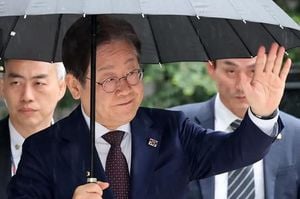In a significant shift within the nuclear technology landscape, Sam Altman, the CEO of OpenAI, has announced his decision to step down as chairman of Oklo, a nuclear power supplier, to avoid any potential conflict of interest. This move comes amid growing interest in nuclear energy as a clean and reliable power source, particularly in light of increasing power consumption driven by the generative AI boom.
The announcement, made on April 22, 2025, sent shares of Oklo tumbling more than 11% in extended trading on the same day. Jacob DeWitte, Oklo's CEO and co-founder, will assume the role of chairman following Altman’s departure. This leadership change is expected to pave the way for potential collaborations between Oklo and other leading AI companies, including OpenAI.
Oklo, which went public in the U.S. in May 2024 through Altman’s special purpose acquisition company, AltC Acquisition Corp., aims to develop its first small modular nuclear reactor by 2027. The startup has been at the forefront of nuclear innovation, working to address the energy demands of the future while mitigating carbon emissions.
According to Caroline Cochran, co-founder of Oklo, the company will continue to explore strategic partnerships with AI firms, enhancing its technological capabilities. "We are excited to explore partnerships that leverage AI technology to enhance our operations and development processes," Cochran stated, emphasizing the potential synergies between nuclear power and AI advancements.
In March 2025, Oklo initiated a Pre-Application Readiness Assessment with the U.S. Nuclear Regulatory Commission (NRC) for its Aurora Powerhouse reactors. This assessment is a critical step in the regulatory process, as it addresses the first phase of Oklo's combined license application submission for these innovative reactors.
The Aurora Powerhouse aims to provide a new generation of nuclear reactors that are smaller, safer, and more efficient than traditional nuclear power plants. With a focus on modular design, these reactors are expected to be deployed more rapidly and with lower upfront costs, making nuclear energy more accessible.
Additionally, in December 2024, Oklo signed a non-binding agreement to supply power to Switch, a Las Vegas-based data center operator. This agreement highlights the growing intersection between data centers and nuclear power, as companies seek reliable energy sources to support their operations while striving for sustainability.
Altman's decision to step down underscores the complexities at the intersection of AI and energy sectors, particularly as both industries evolve to meet the challenges of climate change and energy sustainability. As the demand for clean energy surges, the role of nuclear power is increasingly viewed as essential in achieving net-zero carbon emissions.
In recent years, interest in nuclear power has surged after decades of stagnation. The generative AI boom has not only increased power consumption but has also prompted companies worldwide to rethink their energy strategies. As a result, nuclear energy is gaining traction as a viable solution to meet the growing energy demands while reducing carbon footprints.
Experts believe that the collaboration between AI and nuclear technology could lead to groundbreaking advancements in energy efficiency and safety. As companies like Oklo continue to innovate, the potential for AI to optimize nuclear operations is becoming clearer. This could include everything from predictive maintenance to enhanced safety protocols, creating a more resilient energy infrastructure.
Altman's leadership at Oklo was marked by a commitment to innovation and sustainability. His departure as chairman may signal a new chapter for the company, one that could be defined by closer ties to the AI sector. As Oklo continues to navigate the regulatory landscape and develop its reactor technology, the implications of Altman’s step back will be closely watched by investors and industry analysts alike.
Looking ahead, the future of nuclear power in the context of AI partnerships remains uncertain but filled with potential. As the energy landscape continues to evolve, the convergence of these two fields could lead to significant advancements in how we produce and consume energy.
In conclusion, Sam Altman's decision to resign from his position at Oklo reflects the growing complexities of leadership in rapidly evolving industries. With nuclear power poised to play a critical role in the global energy transition, the collaboration between AI and nuclear technology may very well shape the future of energy.





